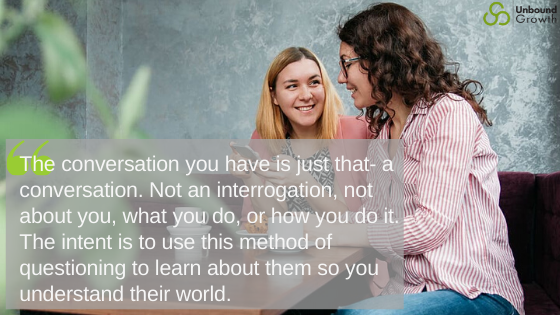
One of the marketing agencies I coach works exclusively with lawyers. Like many of us, he struggled with taking smaller steps with prospects. He jumped to things that the other person wasn’t ready for, or made them feel like they were about to be sold to.
To help then develop an appropriate mindset around his sales process, their buying process, and how to ask questions that seek to understand rather than be understood, we used the methods lawyers learn in direct and cross examination of witnesses.
As a side note: The reason we use various metaphors to explain the inbound sales process is to help clients develop a mindset more than memorized processes and steps. Another one of my clients is an avid hunter. For him, I tell him it is what happens when you move too fast on a deer, you spook it and lose your shot.
But that is another metaphor for another day.
Why do we use metaphors during coaching?
Mark Roberge recently said at Port Cities Inbound that one of the first steps he puts new sales people through is to get immersed in their prospects world. Read what they read, face the challenges they face, speak their language. Once you have the mindset right, the processes and steps are easier to figure out and remember naturally.
The 10 Rules of Cross Examination
Disclaimer: The conversation you have is just that- a conversation. Not an interrogation, not about you, what you do, or how you do it. The intent is to use this method of questioning to learn about them so you understand their world.
I’m not a lawyer, though my mother always told me I should have been, but I do watch a lot of lawyer shows. Still I had to look up the rules of cross examination and came across Timothy Pratt’s explanation.
The basic premise is that when the plaintiff's attorney questions a witness, they are laying the foundation for the defendant’s attorney to ask questions. Generally, cross-examination is limited to matters brought out during the direct examination of the witness. The attorney may ask leading questions during cross-examination.
This is the most important part and where many inbound sales people and marketers go wrong. We know so much, and so we assume so much and end up jumping to fast or in the wrong direction. We forget to have the simple conversation.

-
Be prepared.
Apparently trial lawyers and sales people both overlook this basic principle. Check their company website and the about us page to see who is who. Find them on LinkedIn and compare what you see to their about us page, are there any discrepancies? What is their role, what did they do before? Who do they work with? Who has recommended them and for what? Who have they recommended and for what? A trial lawyer wants to know how credible their witness is, so should a sales person. -
Have objectives.
A lawyer has to know why they are talking to this witness, what are the points he or she wants to get across to the jury? A sales person also has to know why the prospect is downloading, requesting, or talking to them. Whose idea was it? What are they expecting or hoping to learn? What is their next step, what is yours? -
Take baby steps!
Sometimes in the rush to get through their sales process, sales people take bigger steps than they should which causes prospects to put up walls. Patience is a virtue, not a disease as my Nana would say, Yes, objectives are important, but, "not as important as the journey to get there." The pace must be conversational and not driven by just you. If you hurry, the point or objective is easily misunderstood, and therefore “a misunderstood point is no point at all.” -
Ask leading questions.
In sales this gives the sales person more control over the conversation, but it also verifies that you have heard it right and understand and not making assumptions that are incorrect. Leading questions should be asked not just by making a statement and following it with “Is that correct?” but with those who are the influencer or end user, asking leading questions in a gentle way is important to not seem patronizing or interrogative. -
Be alert and adaptable.
We all have a style, a way we buy, a way we sell. Knowing your own style and how to detect how it might clash or sync with someone’s buying process is a crucial soft skill. Some call it emotional intelligence, others use DiSC. I once had a science teacher in college who had all his students take a Myer-Briggs to help us understand our learning style so that we could adapt it to his teaching style. -
The Law of Holes.
Know when to quit. Stop wasting time with the wrong prospects. That time saved can be spent on the right ones and helping them buy the right way. The first law of holes, or the law of holes, refers to a proverb which states that "if you find yourself in a hole, stop digging". The meaning behind it is that if you find yourself in an untenable position, you should stop and change, rather than carry on exacerbating it. -
No scripts.
Lawyers call this “knowing what to take to the podium.” Preparation is good, writing out a few key points is questions is okay to help you and your prospect remember and stay on track. But this is a conversation, not a test to check off the next line in your script. You might not get to say everything you want to in a conversation, and that’s what follow up email is for. Have a content library of go-to information that you can send to bring prospects to ask the questions they should be, so that you can make your points where relevant. -
Know the audience.
In B2B sales, there is usually going to be more than one person in the conversation. Stay away from lingo that not everyone knows and will be bored by. -
Have proof.
Obviously evidence is important in a trial, and it also is with the buying process. Just because you say so doesn’t make it so. If you make a point or ask a question, have evidence (case studies, 3rd party data and reports, content - even from competitors!) to back up your view. -
Know the decision maker.
For lawyers, they need to know the judge, what they will allow, what they won’t, and how they like to run their court room. Same goes for the decision maker- everything you learn during the process should be vetted against what the decision maker thinks.
What’s the metaphor that works for your buyers during the inbound sales process? How are you engaging with inbound leads? Map your questions and steps in the sales process and buyer process with the Layered Questions Worksheet:






